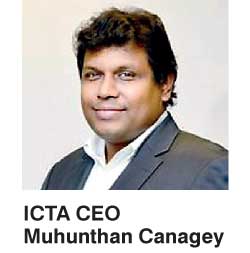Monday Feb 23, 2026
Monday Feb 23, 2026
Monday, 14 August 2017 00:57 - - {{hitsCtrl.values.hits}}
 ICTA CEO Muhunthan Canagey yesterday reiterated that the National Payment Platform (NPP) is not owned, operated and developed by Total Pay.
ICTA CEO Muhunthan Canagey yesterday reiterated that the National Payment Platform (NPP) is not owned, operated and developed by Total Pay.
The National Payment Platform is intended to be an open platform for any FinTech to connect and develop applications which will serve the public to perform service online. It is proposed that the NPP will be operated by ICTA or its subsidiary; ICTA is 100% owned by the Treasury, which is under the Ministry of Finance.
“The implementation of NPP may be a threat to those with vested interests who wish to stick to outdated concepts and technology. Fear of change and the inability to understand the advancements in technology and the world can be deterrent to the development of Sri Lanka as a whole. In Singapore, there are more than 20 platforms operating, including PayPal, Ali Pay, Stripe and local platforms, servicing many application service providers. That is what makes Singapore a great destination for digital commerce. In Sri Lanka we have none, and its importance and need is not addressed.
We deal with the startups on a daily basis and we can feel the pain when creative application providers are unable to provide a complete service delivery. The NPP will bring in the ease for application service providers and FinTech applications to boom. It will also encourage many startups to bring about innovative services to facilitate complete service delivery lifecycle,” Canagey said.
He asserted it was time we move forward as a nation and become leaders or be left behind and continue with the beggar’s bowl mentality. “What is sad is, what other countries implemented 10 to 15 years ago is being pushed back and sabotaged by outdated, not wanting to understand, being territorial and wanting the country to lag behind for selfish and personal gain, at times it is ignorance that is the most dangerous weapon,” he added.
According to Canagey, NPP was architected and designed by an expert team at ICTA, then reviewed by a committee comprising of professional and experts from the industry. The review committee included highly-respected professionals from the industry including six bank chief information officers, six professionals from the technology sector and two senior academics. The review committee report was prepared and compiled by PWC and the facts reported on the report were taken into consideration for enhancing the functionality and introducing improvements.
The governance framework and operational framework of NPP has been designed by leading audit and management firm KPMG. The security audits are being handled by well-respected experts from TechCert and SLCERT. TechCert has facilitated many organisations including banks, and even the interbank switching network.
“NPP will not be detrimental to the financial stability of the country, rather it will enhance the financial stability of the country. It will eliminate inefficiencies, waste and in turn reducing the cost of delivering a service,” he noted.
With regard to the legal status of NPP, Canagey stated there is a difference of opinion and consultations have been held with the Auditor General in this regard. “We believe the name ‘National Payment Platform’ leads many to think it should fall under the ambit of the Payment and Settlements Act, but ICTA is of the view this is a platform for messaging which may include a payment request. However, ICTA will work closely with the Central Bank of Sri Lanka and has no hesitation for NPP to be under its supervision. It is important to recognise and ensure that it will not jeopardise the technology innovation culture and ability for the platform to evolve as and when needed without being caught up in bureaucracy.”
He continued: “Today we have many messaging platforms which operate to carry messages from a sender using a device to the intended receiver who operates a system. We have Telecommunication Service Providers who operate SMS, MMS and routing platforms which carry messages including payment requests. The question is, under what law do all these come and how far should the regulator go in order to regulate these equipment and pieces of software? Who regulates them?
“It’s sad that the laws are also outdated and some interpret the law for ensuring territorial boundaries. The laws too have not evolved to meet today’s technologies. However, if Sri Lanka is to move towards a digital economy, it is important for officials in the public and private sectors to be much broader in their views in terms of working with a culture of collaboration and openness and accepting constructive criticism.”
Canagey stated that the policymakers of the Government of Sri Lanka through the National Budget 2017 voted for a National Payment Platform to be developed and implemented; subsequently on 12 July 2016, the Cabinet of Ministers approved the development of National Payment Platform by ICTA and the Inter-Ministerial Committee for ICT also approved the implementation of the National Payment Platform.
“There were debates on NPP in Parliament prior to the voting of the National Budget for 2017. Once such a policy decision is made and a direction is issued, it is the duty of the mandated agency to proceed on the implementation, in this case it is ICTA. The National Payment Platform is a platform and not a system, the difference between the two is often not understood. In technology, a platform is a set of components that facilitate the development of applications at a rapid pace. To conclude, if Sri Lanka is to implement the digital economy, it is important to be broadminded, non-monopolistic, welcome innovation and creativity and be more conducive to bringing about a culture of collaborative work and accepting constructive criticism,” he added.